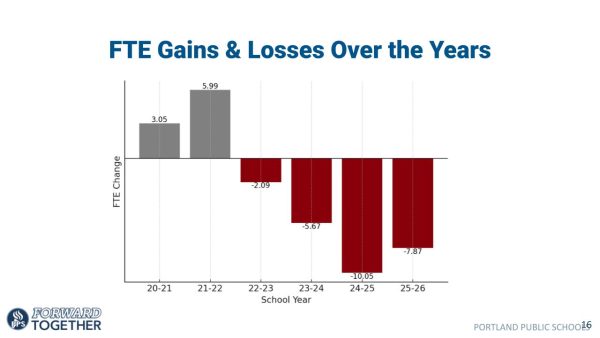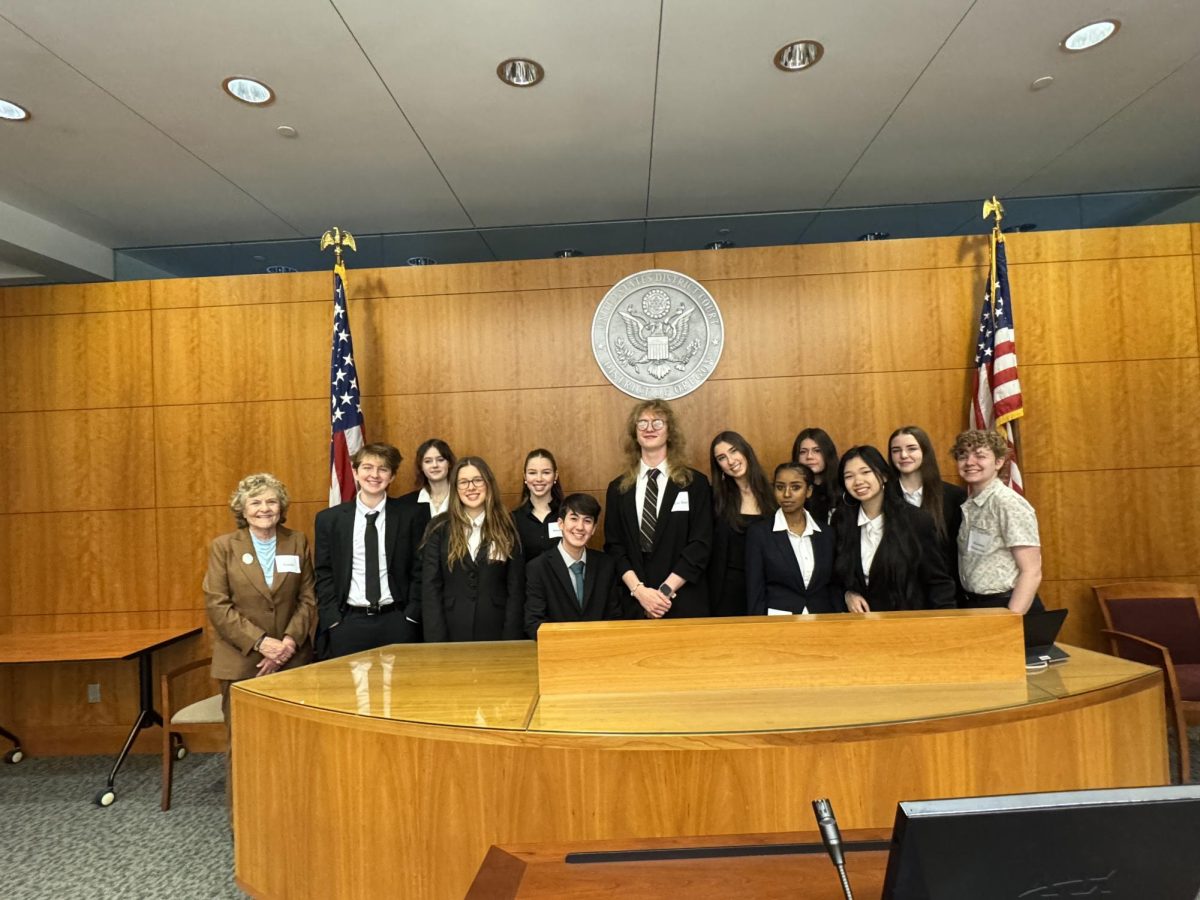
The Portland Public Schools (PPS) budget for the 2025-26 school year was announced this January, and plans to cut roughly $41 million from the general fund. The cuts faced by each PPS school in the upcoming year could result in the loss of up to 228 positions districtwide. Each school was informed about the impacts of budget reductions on their schools on March 11, 2025. The cuts come in the form of Full-Time Equivalents (FTE), or eight-hour-a-day positions. Reductions in FTE include cutting full-time positions, or reducing an employee’s hours and allocating their duties to other staff members. For example, reducing 1.0 to 0.5 FTE means that a full-time staff member’s hours will be cut to part-time.
As part of the projected loss of 228 positions across the district, Franklin is expected to see a reduction of 7.87 FTE in the upcoming school year. After the district decides FTE cuts for each site, principals work to determine how those cuts will be implemented in their schools. Franklin principal Dr. Zulema Naegele explained that decisions about next year’s cuts were “based on student course interest and [staff] seniority.” In an email sent to Franklin staff on March 14, 2025, Naegele detailed the cuts coming to each department: English positions will be reduced by 3 FTE, math by 1.5 FTE, Career and Technical Education by 0.5 FTE, world language by 0.667 FTE, and classified or non-union staff by 0.25 FTE. These reductions will not be made official until the budget is finalized on June 10, 2025. However, it is unknown when, or if, specific staff reductions at Franklin will be officially announced. This district process has multiple rounds, so final staffing and schedules can take some time to come together.
In addition to staffing reductions, Naegele’s email revealed that 9th Grade Inquiry classes will no longer be offered, and that classes with under 15 students enrolled for next year will be discontinued However, PPS Superintendent Dr. Kimberly Armstrong stated that classes under 15 students will be evaluated on a case-by-case basis to determine if they can run for the upcoming school year. Armstrong clarified that this is because the district “wants programs to have the opportunity to build up,” by keeping the smaller but integral courses going.
Despite the widespread changes across the district, Naegele assured that, “Staffing changes and budget reductions will not change course programming or resources that are offered at Franklin.” Naegele also stressed that, “Ongoing communication with the community is very important and will continue,” and that, “The administrative team and student support staff work together as a whole to support students when issues arise.”
Amanda Mayernik, a Franklin staff member for six years, spoke about her experience of being cut two years ago and the impacts of past budget cuts at Franklin. Mayernik worked for five years in the Step Up program and spent her final year as a student support staff member. Step Up program workers are independent contractors within the district, so she was excited to be hired by PPS as a student support staff member. Mayernik assumed the position would last for a while, as the past years’ budget cuts had been counteracted since more support was deemed necessary. However, it was only one year before the position was cut once again.
Mayernik explained that she had to scramble to find a new job and a steady paycheck after being cut: “I had so many connections here with staff, with students, [and I] felt really stable in my role in the school and then I had three months to figure out a different job.” As a non-union employee, she was informed of being cut later than other teachers who were unassigned or cut, giving her less time to find a job.
Teachers who get unassigned may be placed in a different building within their content area if there is a teacher with less seniority in that building. While being unassigned means a teacher still should have a job somewhere in the district — just not in their current building — the district may have to move into the layoff process in some subject areas, which entails people losing employment with the district.
Mayernik was not a teacher, but a non-union staff member, and her position was cut entirely. Mayernik shared that despite the difficulty of losing her position, there was “no animosity knowing that it was a district cut,” and there was nothing that Christopher Frazier, Franklin’s principal at the time, could do to keep her on.
Current Franklin Library Assistant Diane Newton-Prior shared that she has been repeatedly cut from her position in the last few years as a result of budget cuts. She started at Franklin on Dec. 2, 2024, but she has worked for PPS for 22 years as a library assistant. Throughout her time in the district, Newton-Prior has been incredibly impactful to her school communities. Newton-Prior was nominated by Franklin Librarian Ayn Frazee for the PPS Torch Award, which honors exemplary employees, and she will receive the award on May 22, 2025.
Before coming to Franklin, she worked half-time at Glencoe and Grout Elementary Schools, where she assumed she would retire, until she was cut in June 2024. Newton-Prior stated, “Every year since then [I’ve gotten] cut, [but] I don’t take it personally. It’s not me. The position is underfunded.” Library assistants are hired based on seniority, and as Newton-Prior is the current most senior, she would be offered the job at the first school that asks for or needs a library assistant. Despite getting cut numerous times, Newton-Prior has continued to get rehired with limited hours at various sites in PPS.
Though she doesn’t take it personally, the numerous cuts have impacted her emotionally: “It hurts when you have a job you love and then you’re told you don’t have it anymore.” She shared that while library assistant positions have been chronically underfunded, it goes beyond that. In PPS schools, she said, “There’s not enough help. There’s not enough teachers. There’s just not enough.”
As we see the impacts of cuts on community members, many wonder how they can help. President of the Portland Association of Teachers (PAT), Angela Bonilla, encouraged writing to elected officials, speaking at the legislature, voting, and attending budget hearings as ways of using your voice to advocate for more state funding. For students, she said it is incredibly important to remember that “you have to learn to be your strongest advocate.” Bonilla also recommended those already advocating, “Don’t be silenced by folks that tell you it’s not a big deal, it’s a big deal to you, [and] it is worth trying to figure out.”
Both Bonilla and Armstrong are hopeful about how the advocacy for increased state funding is going. Armstrong shared, “The governor won’t adopt the budget until June, so I feel like there’s a window of opportunity to keep the conversation focused on students and resources, and making sure that we’re able to ensure high-quality classrooms across our city.” Bonilla urged, “Don’t be dissuaded by the idea of someone saying things are getting better, because better is still not getting us to good. Our kids deserve more than good, they deserve great.”


































